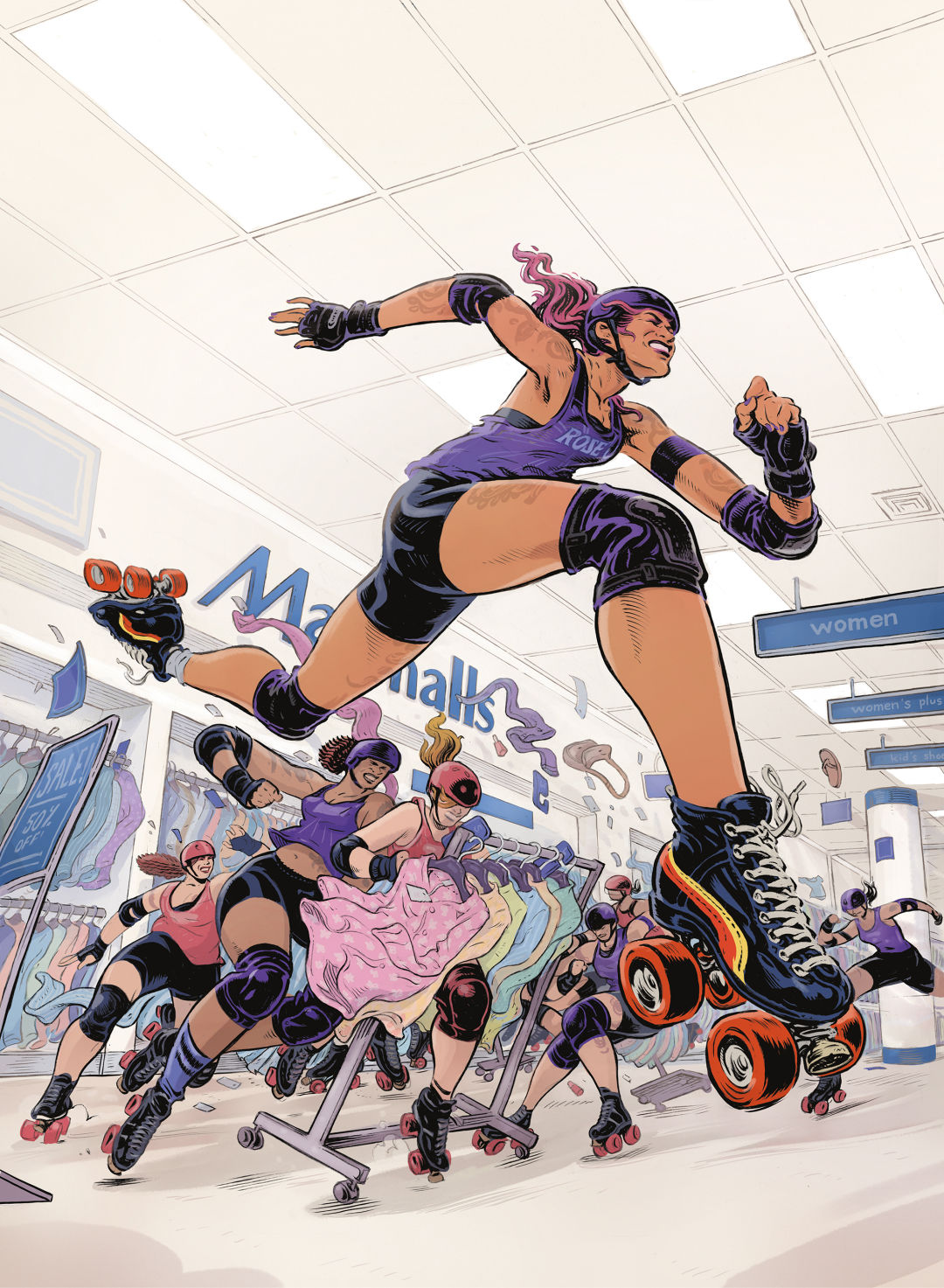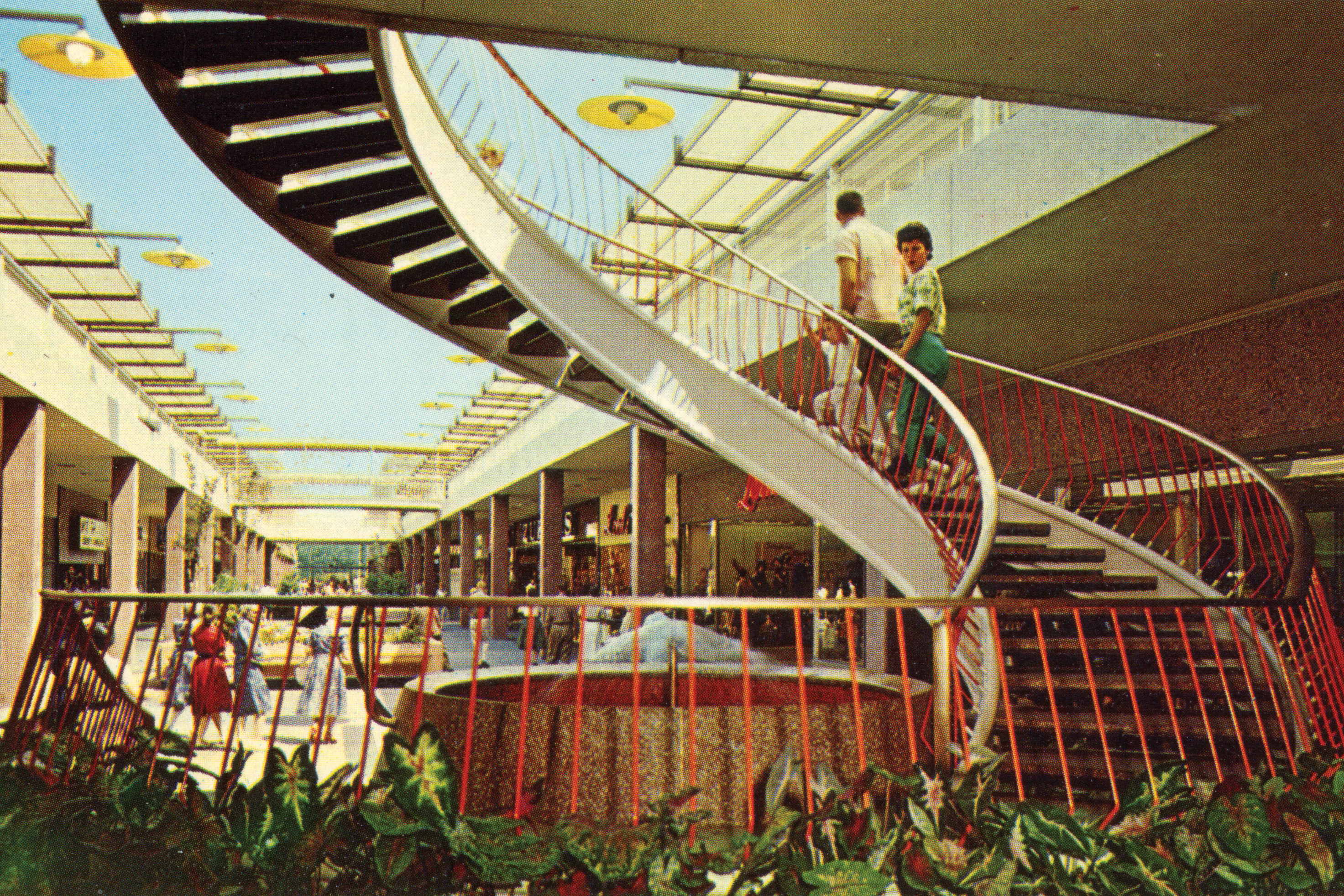What Does Lloyd Center’s Indie Rebirth Say about Portland’s Future?

Image: Lars Leetaru
A
t the start of 2021, in the midst of the then-deadliest COVID wave on record, there was no better place to go to soak up the bleakness of the moment than the Lloyd Center mall in Northeast Portland. It was a perfect microcosm of our city: storefronts shuttering left and right, once-bustling walkways left abandoned, and a palpable sense that normalcy, as we’d known it, might never return.
And it wouldn’t. The iconic mall, like so many other large-scale shopping centers throughout the country, continued to struggle against a confluence of factors, including a pandemic-fueled increase in e-commerce, racked-up debt from costly renovation efforts, and the closing of Macy’s, its last remaining anchor. By the end of the year, word spread of its seemingly imminent foreclosure. It was more bad news to top off the worst two years of bad news in living memory. Defeated, the entirety of Portland’s former mall-rat populace let out a collective—if unsurprised—sigh.
Flash forward to summer 2022: a red, inflatable tube man flails wildly in the window of the old Vans store, calling attention to an extensive display of hand-printed tees. A DJ’s electronic music blasts out of what was once Lids, as customers inside comb through stacks of records and zines. On the floor above, comic book enthusiasts line up to browse a vast selection of publications in the halls of the former Torrid.
This is anything but a return to normalcy: it’s the opening party for Dreem Street, Musique Plastique, and Floating World Comics, three of the newest Lloyd Center tenants helping pave the way for a local, small business–driven revival—and reimagining—of the beloved mall. Dragged along by his “younger and hipper” spouse, city commissioner Dan Ryan was in attendance, and was “blown away” by what he saw.
“People were thrilled,” says Ryan. “It looked like community supporting one another.”
Musique Plastique was the first of this group of artistically minded Portland businesses to set up shop in the Lloyd Center. On the heels of a COVID-caused closure at his previous Alberta Street location, owner Tony Remple was in search of a new space but found himself faced with prohibitively expensive rent throughout the rest of the city. Then, he stumbled upon the Lloyd Center.
By this point, the mall was at a crossroads. New owner KKR Real Estate Financial Trust had just brought on Seattle-based developer Urban Renaissance Group at the end of 2021 to manage the revitalization efforts on the ground. To bring back business, there was a clear priority at the top of the list: get vacancies filled. From Remple’s perspective, this presented a golden opportunity. The retail spaces were fully built-out, move-in ready, and, perhaps most important, cheap. He made the move.
Before long, Jason Leivian, a friend of Remple’s and owner of Floating World Comics, caught wind of Musique Plastique’s new mall shop, and their subsequent success. By this point Musique Plastique had started throwing regular mall parties, noise shows, and DJ sets in collaboration with Spoiler Room, an “audiovisual media collective.” Feeling restless at his longtime Old Town-Chinatown location (and perhaps a bit of FOMO), Leivian scheduled a tour. Just two weeks later, he was setting up shop in the Lloyd Center.
Since Floating World moved to the mall, Leivian has taken on the role of ambassador to what he refers to as the “Lloyd Arts District,” reaching out to as many like-minded small business owners as possible to spread the word. He envisions a full-on “indie-alternative” mall, made up of art-focused shops, regular events to help foster community, and even a local food court on the third floor.
“Downtown, I basically had zero influence or control over the changes that might need to happen,” says Leivian. “At Lloyd Center, I feel like I have some influence over the future of its landscape.”
So far, his efforts seem to be making waves. Since the opening party in August, there has been a steady stream of prospective businesses reaching out to Lloyd Center management, including a popular pizzeria, a comedy club, and a beloved movie theater hoping to host film screenings in the mall. Even the massive empty anchor stores are being put to use; September saw the Secret Roller Disco transform the Marshalls into a temporary skate rink. (A wishful future home for the Rose City Rollers, perhaps, à la our illustration?) Now there are even talks of turning the Macy’s into an indie film studio.
For veteran tattoo artist Olivia Britz-Wheat, it seemed like a low-risk opportunity to move on from her longtime home at Scapegoat Tattoo in inner Southeast Portland and finally open a shop of her own.
“A standard brick-and-mortar comes with risks,” says Britz-Wheat. “At Lloyd Center, I don’t have to worry about a ceiling that leaks and a landlord that won’t return my phone calls. There’s security in knowing that Lloyd Center is a well-maintained space, with a crew of people who’ve been there for a long time.”
To Britz-Wheat, the move toward an indie-alternative mall feels reminiscent of an older, cheaper version of Portland, one where artist types could see their visions through without breaking the bank.
“I think it’s going to attract creative people who are looking for new ways to connect with others,” she says. “A space that’s affordable for artists [is] a wonderful opportunity that isn’t possible in other parts of the city unless you have a ton of money.”
City historian and urban planning expert Dr. Carl Abbott draws the same comparison.
“The Pearl District 35 years ago was a bunch of old warehouses full of artists,” says Abbott. “One of the things that made Portland so great for creative, hip people in the ’80s and ’90s was cheap space.”
Affordable rent is the driving force behind the Lloyd Arts District vision. It’s made the mall a kind of tabula rasa, where what would have felt impossible prepandemic feels within reach. But there’s no way to know how long this might last. Urban Renaissance Group managing director Tom Kilbane says they are loving the “renewed energy and excitment” of new tenants. But the mall’s fate rests in the hands of its now owners, KKR.
Is the revival of the Lloyd Center a mere moment of brightness on the heels of a very dark past couple of years? Or is this the beginning of more good news to come? Either way, these small businesses are altering the Lloyd Center’s landscape.
“Positive changes in our city are driven by grassroots business, and grassroots creativity,” says Abbott. “That energy hasn’t had a whole lot of outlets in the last two or three years. I think there’s a market for it.”
But the energy around the mall may be more than just a nostalgic harkening back to Old Portland. To Dan Ryan, it’s an example of how to pave the way for a brighter future.
“We need [community] building right now,” says Ryan. “And we need one another. It’s going to take a lot of shared vision and alignment to build forward.”




